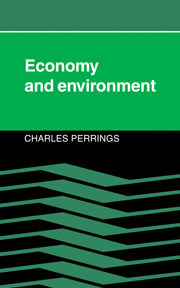 Economy and Environment
Economy and Environment Book contents
- Frontmatter
- Contents
- Preface
- Notation Guide
- 1 Introduction
- Part I The physical economy-environment system
- Part II The economic system
- Part III Environmental strategies in an evolutionary economy-environment system
- 8 Time, uncertainty, and external effects
- 9 The market solution
- 10 The stationary state
- 11 Conclusions
- References
- Index
10 - The stationary state
Published online by Cambridge University Press: 20 March 2010
- Frontmatter
- Contents
- Preface
- Notation Guide
- 1 Introduction
- Part I The physical economy-environment system
- Part II The economic system
- Part III Environmental strategies in an evolutionary economy-environment system
- 8 Time, uncertainty, and external effects
- 9 The market solution
- 10 The stationary state
- 11 Conclusions
- References
- Index
Summary
The stationary state in political economy
The environmental strategy behind the market solution supposes that all significant long-period problems associated with economic growth in an economy-environment system of fixed mass may be resolved in the marketplace. It supposes that economic signals generated in the course of transactions between economic agents will be sufficient to head off such global depletion and pollution disasters as those predicted by the Club of Rome. More particularly, it supposes that the negative feedbacks of the price system will ensure that rational economic agents cannot overexploit their environment. It is important to appreciate, though, that the market solution represents an historically unique environmental strategy, and an historically unique sense of rationality. It has no direct parallels in other societies. Indeed, it shares very few features with the environmental strategies of other societies.
To understand the differentia specifica of the market solution it is useful to look at other environmental strategies. Although this takes us beyond the bounds of the modern economy, and beyond the rationality of modern economic theory, it addresses similar issues to those raised in various modern debates about the environmental implications of economic growth. The Club of Rome debate, for example, was largely about alternative environmental strategies. The antigrowth elements in the arguments of Forrester et al. were, at the same time, positive pleas for a more quiescent approach to the management of the environment.
- Type
- Chapter
- Information
- Economy and EnvironmentA Theoretical Essay on the Interdependence of Economic and Environmental Systems, pp. 141 - 152Publisher: Cambridge University PressPrint publication year: 1987


